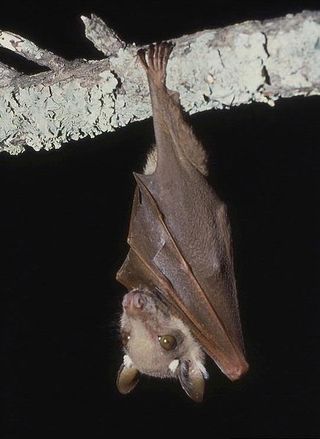
Picture has been licensed under a Creative Commons Attribution.
Original source: This image is Image Number 5369373 at Forestry Images, a source for forest health, natural resources and silviculture images operated by The Bugwood Network at the University of Georgia and the USDA Forest Service.
Author: Susan Ellis, Bugwoord.org
Original source: This image is Image Number 5369373 at Forestry Images, a source for forest health, natural resources and silviculture images operated by The Bugwood Network at the University of Georgia and the USDA Forest Service.
Author: Susan Ellis, Bugwoord.org
Wahlberg's epauletted fruit bat
Order : Chiroptera
Family : Pteropodidae
Subfamily : Pteropodinae
Species : Epomophorus wahlbergi
The Wahlberg's epauletted fruit bat is listed as Least Concern. Does not qualify for a more at risk category. Widespread and abundant taxa are included in this category, on the IUCN Red List of Threatened Species
Namings for the Wahlberg
A young / baby of a Wahlberg is called a 'pup'. A Wahlberg group is called a 'colony or cloud'.Countries
Angola, Botswana, Burundi, Cameroon, Congo, Democratic Republic of the, Congo, Republic of the, Equatorial Guinea, Gabon, Kenya, Malawi, Mozambique, Rwanda, Somalia, South Africa, Swaziland, Tanzania, Uganda, Zambia and ZimbabweWahlberg's epauletted fruit bat habitats
Dry savanna, Forest, Moist savanna, Savanna and Subtropical / Tropical Dry forestSome facts about the
Wahlberg's epauletted fruit bat
Adult weight : 0.08 kg (0.176 lbs)
Maximum longevity : 10 years
Litter size : 1
Facts about the Wahlberg's epauletted fruit bat
bat, or Epomophorus wahlbergi, is a megabat, thus is of the suborder Megachiroptera and the Pteropodidae family (Corbett 1986). (Full text)
Wahlberg’s epauletted fruit bat is widespread throughout the country while the Cape serotine bat is widespread on the highveld. (Full text)
More animals beginning with W
Custom Search
